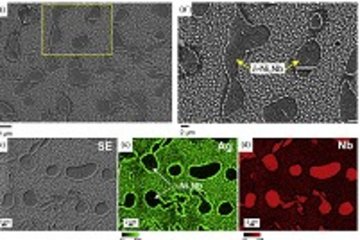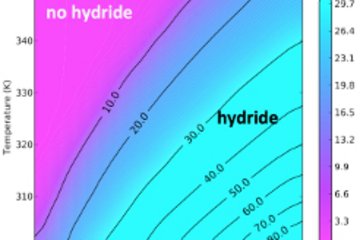All genres
121.
Talk
Entwicklung und Eigenschaften ultrahochfester und supraduktiler Stähle für den Fahrzeugbau. Clausthal Industriekolloquium Sonderforschungsbereich 675, Clausthal (2007)
122.
Talk
Hochfeste und supraduktile Leichtbaustähle für die zukünftige Fahrzeugtechnik. Euroforum - Stahl im Auto, Wiesbaden, Germany (2007)
123.
Talk
Mechanical properties of macroalloyed single phase Fe3Al base alloys of D03 order. EUROMAT 2007, Nürnberg, Germany (2007)
124.
Talk
Mechanical Properties and Corrosion Behaviour of Ferritic Stainless Al Cr Steels. EUROMAT 2007, European Congress and Exhibition an Advanced Materials and Processes, Nürnberg, Germany (2007)
125.
Talk
Mechanical properties and deformation mechanism of high-strength lightweight MnAlC triplex steels. EUROMAT 2007, Nürnberg, Germany (2007)
126.
Talk
Point and layer defects in transition-metal based Laves phases. EUROMAT 2007, Nürnberg, Germany (2007)
127.
Talk
Phase equilibria in the Nb–Cr–Al system at 1150, 1300 and 1450 °C. Workshop "The Nature of Laves Phases IX", Stuttgart, Germany (2007)
128.
Talk
Direct casting and rapid solidification of CuAl SMS wires and characterisation of the microstructure. E-MRS 2007 Fall Meeting, Warsaw, Poland (2007)
129.
Talk
Parameter studies on in-rotating-liquid spinning for rapidly solidified thin wires. 5th Decannial International Conference on Solidification Processing, Sheffield, UK (2007)
130.
Talk
Hochfeste und supraduktile Leichtbaustähle für die zukünftige Fahrzeugtechnik. 1. Handelsblatt Tagung: Werkstoffsymposium Fahrzeugtechnik, Stuttgart, Germany (2007)
131.
Talk
Shear band induced plasticity and high-strength of Fe-Mn-Al-C triplex steels. Plasticity 2007, Alaska (2007)
132.
Talk
Konstitution, Mikrostruktur - physikalisch-mechanische Eigenschaften - Tiefziehfähigkeit, Blechumformung, - Passivierungsverhalten, Korrosionseigenschaften - Anwendungsperspektiven. VDI Wissensforum Seminar: Nichtrostende Stähle - Systematik der Werkstoffe und Schadensprävention bei ihrer Anwendung, Düsseldorf, Germany (2007)
133.
Talk
Microstructure, atomic ordering, surface tension, and viscosity of μg-processed iron-aluminium-silicon alloys with up to 6.5 wt.% Al+Si. Meeting "TEMPUS Parabolic Flight 2006", DLR Bonn, Germany (2007)
134.
Talk
Mechanical properties and structural superplasticity in ultrafine-grained 945 - Titanium Tix Mey - Intermetallic Ti–8Fe–4Al, Ti–10Co–4Al and Ti-10Ni-4Al alloys. TMS 2007 Annual Meeting, Orlando, FL, USA (2007)
135.
Talk
Properties of refractory NiAl(Cr, Mo, Re) alloys in relation to atomic defects and microstructures. TMS 2007 Annual Meeting, Orlando, FL, USA (2007)
136.
Talk
Process parameters and microstructures of high silicon containing Fe-Si alloys produced under μg conditions. German User Day, Noordwijk, Netherlands (2007)
137.
Talk
The Nature of Laves Phases - Case Studies on Selected Binary and Ternary Transition Metal Systems. MRS Fall Conference 2006, Boston, MA, USA (2006)
138.
Talk
Properties of refractory NiAl-(Cr, Mo, Re) alloys in relation to Atomic Defects and Microstructures. High Temperature Materials Chemistry, Wien, Austria (2006)
139.
Talk
Konstitutionsuntersuchungen im System Nb-Cr-Al: Erste Ergebnisse und weitere Planungen. Workshop: The Nature of Laves Phases VII, MPI für Metallforschung Stuttgart, Germany (2006)
140.
Talk
Iron-Silicon Alloys with 3.5, 4.5 and 5.5 wt.% Si Processed under Microgravity. TEMPUS Parabolic Airplane Flight 2006 Meeting, DLR Bonn, Germany (2006)











